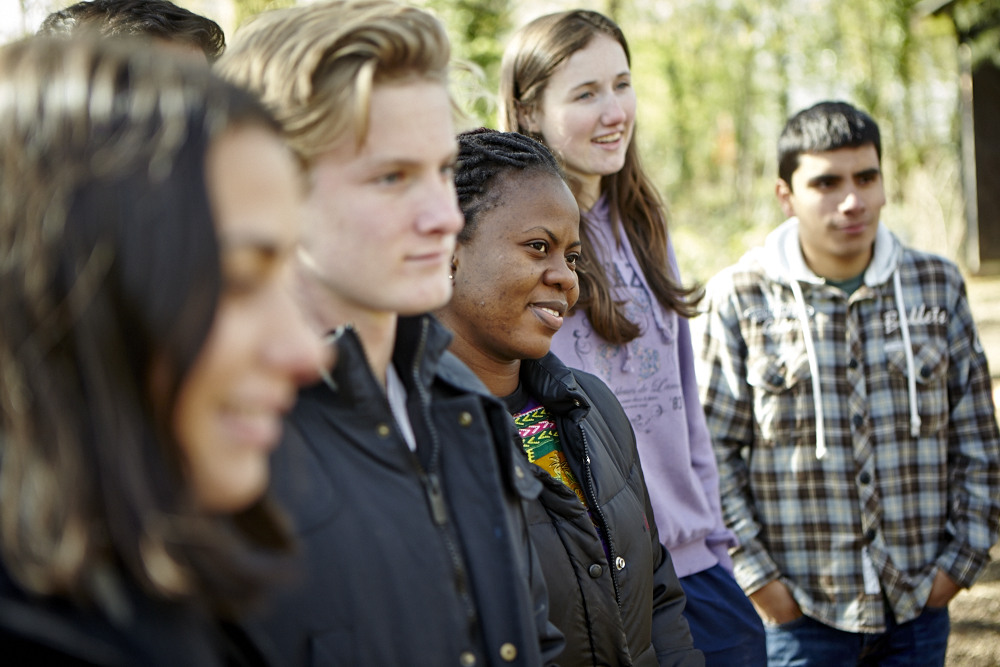Explorer Scouts - 14 to 18 years
Try more. See more. Do more.
At Explorers, you’ll stand on your own two feet, and make memories to last a lifetime.
Explorers are a go-getting group of young people aged 14 to 18. Together, they make up the fourth section of the Scouts.
Week in and week out, they gather in groups called Units to try new things, make new friends and conquer the small task of changing the world.
What do Explorers get up to?
Discover the world.
Being an Explorer is all about discovering the world on your own terms and making the most of what you have, wherever and whoever you are.
Alongside your new friends, you’ll master the skills that will make you feel stronger and happier in the long run, and try things you’d never get the chance to do at home or at school.
Whether you’re hiking to faraway lands or building a robot in your local town hall, you’ll have the freedom to choose what you’d like to do, and work together with adults to make it happen.
Start small but think big.
They stand up for what they believe and make a difference on their own doorstops, confident in the knowledge that their daily actions add up.
Seek out the answers to big questions.
Explorers seek out the answers to the big questions, and to the smaller questions that don’t seem to matter but really should.
Most importantly, they say yes more often than they say no - whether they’re signing up for their first major hike across Europe, or writing their first line of code, or accepting the last of the toasted marshmallows.
Who leads Explorers?
Explorer units are made up of young people aged 14 to 18, led by adult volunteers who are on hand to share their skills and keep everyone safe.
Within their unit, explorers work as a team - sometimes in smaller groups of explorers who look out for one another, and help each other grow. Explorers usually gather in their patrols at the beginning and end of meetings. They might also stick together on expeditions or trips away, or during certain activities.
Explorers are part of the global scout family. Closer to home, they’re part of their wider local scout district, alongside network members (aged 18 to 25). Most explorer units may have a close link with a scout group in a local area.
Awards and Badges
Progressive Awards
Explorers continue the scouting programme of progressive awards. The requirements of each stage become more challenging, reflecting the age and abilities of the young people undertaking the awards.
The three stages of the awards open to explorers are (in ascending order):
-
The Chief Scout's Platinum Award
-
The Chief Scout's Diamond Award
-
The Queen's Scout Award
Each level requires explorers demonstrate community, faith, self-motivation, personal discipline, and many other qualities.
The Duke of Edinburgh's Award works alongside the scout awards, and completion of certain sections of either award can contribute to the other.
Explorer Belt
The explorer belt is open to all members of scouting between the ages of 16-25, and is aimed at promoting self-reliance, teamwork, and adventurous spirit.
The explorer belt requires participants to undertake a 10-day expedition in a foreign country, devoting some time to travelling around and exploring. Participants also have to undertake a major project of their own choosing, along with a number of smaller projects or challenges — some of which are not revealed to them until the start of the expedition.
Activity Badges
There are a number of activity and skill badges which can be awarded upon meeting requirements in a variety of disciplines from horse-riding to first aid. (List of badges)
Staged Activity Badges
Staged Activity Badges can be completed by any member of the Movement between the age of 6 and 18. They are completed in different stages, so after completing each stage Members are awarded the relevant badge. As they can be completed in Beaver Scouts, Cub Scouts, Scouts and Explorers it is possible for a Beaver Scout to attain a higher level of a Staged Activity Badge than a Member from a higher Section.
Staged Activity badges that are available are Air Activities, Community Impact, Digital Citizen, Digital Maker, Emergency Aid, Hikes Away, Musician, Nautical Skills, Navigator, Nights Away, Paddle Sports, Sailing, Swimmer and Time on the Water. The number of stages in each badge varies.
Can young people become leaders?
Absolutely. If taking the lead sounds like something you’d like to try for yourself, sign up for the Explorer Scout Young Leader’s Scheme to get some hands-on experience volunteering with the younger Scout sections.
Young Leaders are Explorer Scouts who choose to provide leadership in beaver colonies, cub packs or scout troops alongside the adult leadership team. Young leaders have a training programme similar to that of adult leaders and consisting of eleven modules and four missions (projects). to find out more about our Young leaders scheme click here.

